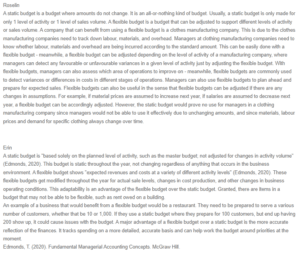Peer Responses – Static and Flexible Budgets
Response 1
Hello Erin,
Thank you, Johnson, for your intriguing post. I agree with your definition of a static budget. However, I would like to add that it’s characterized by a provision that ensures the budget does not stretch beyond a definite activity volume. A static budget is strictly confined to predetermined activities and tasks and does not leave room for future alterations (Ilhan et al., 2019). Budgeting remains constant throughout the year regardless of any changes in the market. It is characteristic of operating within a strict budget that confines its application to educational, nonprofit, and governmental organizations because they operate on established operations that rarely change or evolve within a financial year.
Flexible budgets, however, provide for anticipated revenues and costs, which are determined by variations in the levels of activity. The budgets can be modified whenever changes are experienced in the cost of production to suit needs. It’s more prevalent than a static budget because it strictly tracks spending details and can be used for prioritization when budgeting.
References
Ilhan, E., Gow, J., & Perez-Liebana, D. (2019, August). Teaching on a budget in multi-agent deep reinforcement learning. In 2019 IEEE Conference on Games (CoG) (pp. 1-8). IEEE.
Response 2
Hello Roselin,
Your post is intriguing, and you have provided a simplified definition and explanation of the concepts of static and flexible budgets. I agree that a simple characteristic of a static budget is that amounts allocated for activities do not change. Specifically, I learned that static budgets could only be used for a single activity level. The differentiating factor between flexible and static budgets is the ability of flexible budgets to be adjusted or modified depending on future needs, like alterations in production costs or levels of activities (Alsharari, 2019).
I agree with the example you provided because a cloth manufacturing company operates within an evolving industry prone to changes in demand, cost of production, and manufacturing approaches as the design evolves. The rationale for its application in the textile industry lies in factors like changes in cloth taste, which forces the firm to change designs, thus altering costs and activities of production to necessitate modification of the budgets. You provided excellent explanations about how the budget applies to the cloth industry, and I learned a lot. Great Post!
References
Alsharari, N. M. (2019). Accounting changes and beyond budgeting principles (BBP) in the public sector: institutional isomorphism. International Journal of Public Sector Management.
ORDER A PLAGIARISM-FREE PAPER HERE
We’ll write everything from scratch
Question

Peer Responses – Static and Flexible Budgets
Roselin
A static budget is a budget where amounts do not change. It is an all-or-nothing kind of budget. Usually, a static budget is only made for only 1 level of activity or 1 level of sales volume. A flexible budget is a budget that can be adjusted to support different levels of activity or sales volume. A company that can benefit from using a flexible budget is a clothes manufacturing company. This is due to the clothes manufacturing companies need to track down labour, materials, and overhead. Managers at clothing manufacturing companies need to know whether labour, materials and overhead are being incurred according to the standard amount. This can be easily done with a flexible budget – meanwhile, a flexible budget can be adjusted depending on the level of activity of a manufacturing company, where managers can detect any favourable or unfavourable variances in a given level of activity just by adjusting the flexible budget. With flexible budgets, managers can also assess which area of operations to improve on – meanwhile, flexible budgets are commonly used to detect variances or differences in costs in different stages of operations. Managers can also use flexible budgets to plan ahead and prepare for expected sales. Flexible budgets can also be useful in the sense that flexible budgets can be adjusted if there are any changes in assumptions. For example, if material prices are assumed to increase next year, if salaries are assumed to decrease next year, a flexible budget can be accordingly adjusted. However, the static budget would prove no use for managers in a clothing manufacturing company since managers would not be able to use it effectively due to unchanging amounts, and since materials, labour prices and demand for specific clothing always change over time.
Erin
A static budget is “based solely on the planned level of activity, such as the master budget; not adjusted for changes in activity volume” (Edmonds, 2020). This budget is static throughout the year, not changing regardless of anything that occurs in the business environment. A flexible budget shows “expected revenues and costs at a variety of different activity levels” (Edmonds, 2020). These flexible budgets get modified throughout the year for actual sale levels, changes in cost production, and other changes in business operating conditions. This adaptability is an advantage of the flexible budget over the static budget. Granted, there are items in a budget that may not be able to be flexible, such as rent owed on a building.
An example of a business that would benefit from a flexible budget would be a restaurant. They need to be prepared to serve a various number of customers, whether that be 10 or 1,000. If they use a static budget where they prepare for 100 customers, but end up having 200 show up, it could cause issues with the budget. A major advantage of a flexible budget over a static budget is the more accurate reflection of the finances. It tracks spending on a more detailed, accurate basis and can help work the budget around priorities at the moment.
Edmonds, T. (2020). Fundamental Managerial Accounting Concepts. McGraw Hill.

